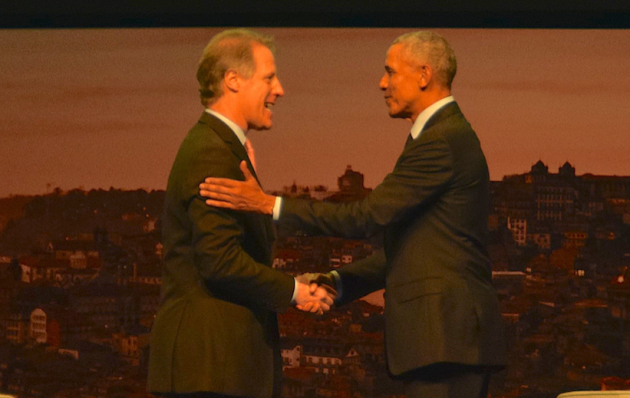
Porto Protocol calls on wine industry to take lead on climate change
Fladgate Partnership’s CEO Adrian Bridge used the Climate Change Leadership Summit in Oporto on 6 July to announce the launch of the Porto Protocol, a far reaching initiative designed to encourage and enable the wine trade to step up to the pressing challenge of global warming.
Joining speakers including leading climate change campaigner and former US president Barack Obama and noted climate expert Professor Mohan Munasinghe, Bridge reminded the audience that “evidence of climate change is clear and incontrovertible”, while outlining the “sensitivity and vulnerability” of vineyards and grape growing.
The Taylor’s Port sponsored Porto Protocol focuses on two major objectives, being designed to encourage all to do more to tackle and help mitigate climate change, while also offering a platform where signatories can share information on initiatives and achievements pertaining to combating the causes of climate change.
“Today, at this Summit, we are launching the Porto Protocol. This will be followed by a conference in March 2019 called Climate Change Leadership – Solutions for the Wine Industry, where we will focus on real examples of what companies are doing to mitigate climate change,” said Bridge.
He made clear that the Climate Change Leadership Summit and Porto Protocol were not about restating the need for action, but “to discuss concrete ideas, share real experiences and provide effective solutions which have been shown to work, on whatever scale.”
Justifying the placing of wine at the centre of a sustainable global future, Bridge spoke of the enrichment vine growing delivers to economies and environments of many remote but interconnected corners of the world.
He continued to develop the theme, stating that the intergenerational longevity of tending vineyards and the fact that, as the world’s only branded agricultural product, wine is in a unique position to draw on its heritage and stories, mean that the wine world is well-placed to “talk directly to the consumer and [that the] consumers listen”.
Referencing the concept of terroir, Bridge said that consumers understand that vine growers and winemakers are custodians of the environment and that they also care.
Describing the nature of the approach now taken by businesses in the face of climate change as "critical", Obama later added that both adaptation and mitigation were among several strategies needed.
“No matter what we do at this point the climate will be getting warmer for some time,” said Obama.
“And what that means is that adaptation is going to be required. And that means, for winemakers for example, to share best practices in terms of how they can sustain their industry in the face of rising temperatures. And the product that you make is sensitive, so that makes perfect sense.”
“It is also important for industries being affected to publicise the impact that climate change is already having. Because one of the challenges in the climate debate is always that it kind of creeps up on you. It’s not an immediate catastrophe,” said Obama.
While the wine industry is invited to be a central driver of the Porto Protocol, the initiative is open to all areas of economic activity, seeking to encourage signatories to spread the call to action through sharing of information, experiences and transparency.
“For the Porto Protocol to make a real difference, we need participation from individuals, companies and organisations from all areas, in Portugal and around the globe. The wine industry may be the starting point and is well placed to initiate and mentor the process. However, the Porto Protocol is an open platform, a dynamic database of ideas, a shared resource from which we can all benefit, whatever our area of activity,” said Bridge.
He was joined by other speakers in urging that the while there is still time to mitigate and adapt with regard to some of the worst effects that climate change is already delivering, there is no longer any time for inaction.
The message – reasoned, persuasive and loud and clear – from Obama, Munasinghe and others, was that there is now an overwhelming economic, cultural and humanitarian imperative to deliver much greater positive change and that the world needs to fully embrace the urgency with which this is necessary.
As Munasinghe said: “The planet will survive climate change – the question is whether humans will survive.”
A fuller report on the Porto Protocol, the Climate Change Leadership Summit and both the impact of climate change on wine and the role that the wine trade can play will appear in the August issue of Harpers.
Keywords:
- climate change
- Adrian Bridge
- Fladgate Partnership
- Leadership Summit
- Oporto
- Barack Obama
- Mohan Munasinghe
- Porto Protocol





